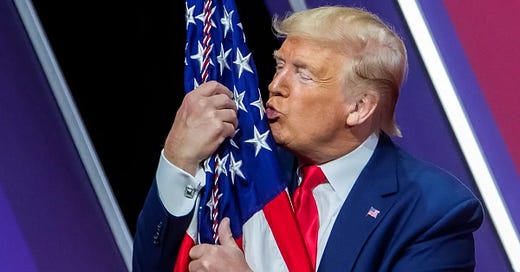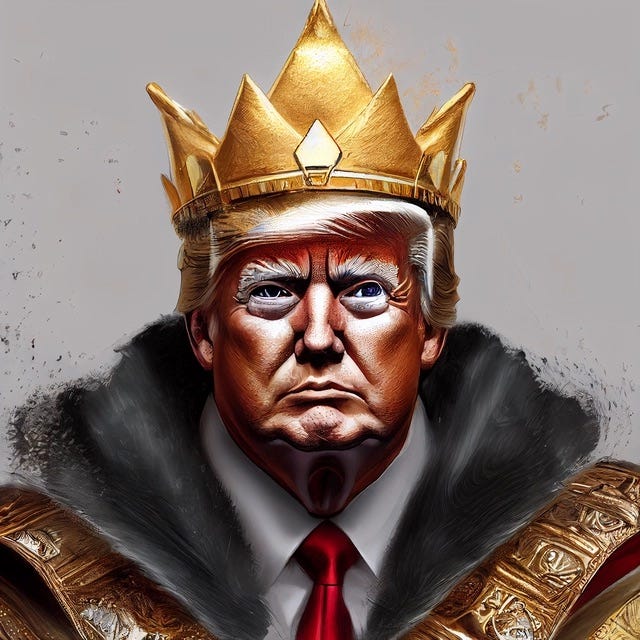Today, June 13, 2023, Donald Trump was arraigned on thirty-seven criminal counts in Florida related to mishandling classified documents and obstructing justice by refusing to return them. “Mishandling” seems a pretty tepid term for leaving nuclear and other military secrets lying around his faux luxury Mar a Lago bathroom for wandering Saudi, Chinese, or Russian agents to read on the shitter. But unsurprisingly, MAGA Republicans appear to see no problem in this episode other than the Justice Department's attempt to hold him accountable. Their fervid flag-waving has always been an unfunny joke. Since the former president's first open invitation to Russia to help him get elected, the GOP's fawning amen chorus in Congress has made it clear its allegiance rests with the leader, not the country. No praise could be too loud. Yet, given the magnitude of Trump's current disregard for national security, their fascist virtue-signaling could pose a moral dilemma.
Do they criticize their party's leader for his dangerous and treasonous actions and risk alienating the base and earning the condemnation of colleagues? Or do they stand behind Trump, regardless of his illegal and amoral conduct, as nearly all Republicans have done since 2016? As the research has established, ingroup loyalty is a fundamental moral intuition for conservatives. It is a core driver behind their policy positions and political choices. But what do they do when loyalty to the leader requires disloyalty to the nation?
Trump has long given his followers and collaborators a two-pronged escape clause to help them evade that dilemma. The first one is the essence of his brand – MAGA. By making him great, his followers are making America great again. Unlike other politicians who endeavor to wrap themselves in the flag, Trump wraps the flag in himself. (When you’re a star, they let you do it.)
That is his refashioning of the tried-and-true trope of autocratic narcissism – L'État, c'est moi (The state is me). Widely attributed to the French king Louis XIV, some version of it is every dictator's spoken and unspoken stance regardless of ideology. On a microcosmic scale, it is also all cult leaders' explicit and implicit assumption.
That rhetorical conflation of the leader's self-interest with that of the group or nation turns complicity and obedience into heroic loyalty to the tribe. Correspondingly, any attack on the leader is depicted as an attack on members. As Trump told an audience in Georgia following the Florida indictments, "In the end, they're not coming after me. They're coming after you. And I'm just standing in the way."
The second linguistic tactic Trump has deployed to blunt that moral dilemma has been creating an imaginary outside villain that has burrowed its way into the government's core, a kind of internal parasite eating away and corrupting the body politic. That evil entity is the "deep state." And to attack it is to love America. Trump must convince his true believers that the agents of that malevolent cabal are behind all attempts by law enforcement to limit his pursuit of self-enrichment. They are also the ones persecuting him by calling his actions criminal. And anyway, they couldn't be crimes because he is doing them. In case that sounds preposterous, consider that the Florida indictments were denounced by GOP House Speaker Kevin McCarthy and other Republicans before anyone knew what they contained. If the base can be convinced of that, then overthrowing elections, beating cops, and attempting to murder FBI agents are brave acts of patriotism.
Should he read it, Trump will likely be reassured by a survey conducted around the same time that the charges were unsealed. It found that over twelve million US adults think violence is justified to return the former president to power. In another post-indictment poll of Republican voters, eighty percent of the representative sample said that being convicted of violating the Espionage Act should not disqualify him from serving as president again. Since Trump has so far been able to raise money off his alleged crimes, the country will have to look beyond the court system to interrupt the disturbing symbiosis between him and his base.






Ah, but where shall we look outside the courts?